Please fill out the following information, and RRFC Admissions will contact you to discuss our program offerings:
Issue #22
by L. Swift and Jeff McQ
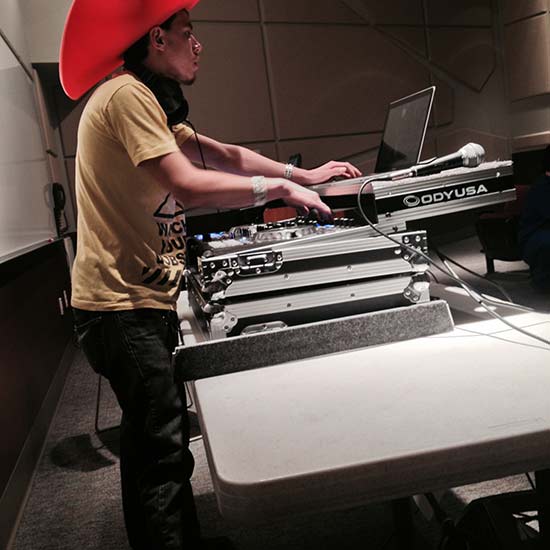 Brenden Mendez has done so well in his Recording Connection apprenticeship at Camel Hump Music in Las Vegas that his mentor, John Brown, has brought him on as a full-time assistant! “We have him working with bands, but personally he really enjoys making beats from scratch,” says his mentor. “We’ll have our students set up and record for bands, mixing, tracking, and we’ll put the finishing touches on the track.”
It’s not uncommon for Recording Connection apprentices to get hired by their mentor studios, but what makes this story remarkable is that Brenden is helping to expand the studio’s musical reach into EDM. “Trivion [one of our engineers] is a hip-hop dude,” says John. “I’m a punk rock guy. We work closely with a record label who deals with a lot of punk and hard rock bands.” Brenden, however, is an aspiring DJ who makes his own beats, and is using his newfound audio and mixing skills to bring EDM into the studio.
“I’m taking a different approach because I wasn’t expecting to go into a studio that was non-EDM,” says Brenden. “Those guys are a hip-hop and rock based studio; I’ve been trying to bring the EDM style into the studio. My mixing skills have greatly improved.”
One of the most important things we urge our apprentices to do is to find ways to become an asset and to add value to the studios where we place them. It appears Brenden is doing just that. Congratulations, Brenden!
Brenden Mendez has done so well in his Recording Connection apprenticeship at Camel Hump Music in Las Vegas that his mentor, John Brown, has brought him on as a full-time assistant! “We have him working with bands, but personally he really enjoys making beats from scratch,” says his mentor. “We’ll have our students set up and record for bands, mixing, tracking, and we’ll put the finishing touches on the track.”
It’s not uncommon for Recording Connection apprentices to get hired by their mentor studios, but what makes this story remarkable is that Brenden is helping to expand the studio’s musical reach into EDM. “Trivion [one of our engineers] is a hip-hop dude,” says John. “I’m a punk rock guy. We work closely with a record label who deals with a lot of punk and hard rock bands.” Brenden, however, is an aspiring DJ who makes his own beats, and is using his newfound audio and mixing skills to bring EDM into the studio.
“I’m taking a different approach because I wasn’t expecting to go into a studio that was non-EDM,” says Brenden. “Those guys are a hip-hop and rock based studio; I’ve been trying to bring the EDM style into the studio. My mixing skills have greatly improved.”
One of the most important things we urge our apprentices to do is to find ways to become an asset and to add value to the studios where we place them. It appears Brenden is doing just that. Congratulations, Brenden!
 This person won an Academy Award for a film he made with one of the main actors in Good Will Hunting.
His filmography includes films about WWII, espionage and undercover operatives.
He loves to make films that matter—films that make statements about our world.
He is also a business partner with one of the world’s most acclaimed filmmakers and actors, and has made himself available to hear our students’ film pitches!
This person won an Academy Award for a film he made with one of the main actors in Good Will Hunting.
His filmography includes films about WWII, espionage and undercover operatives.
He loves to make films that matter—films that make statements about our world.
He is also a business partner with one of the world’s most acclaimed filmmakers and actors, and has made himself available to hear our students’ film pitches!
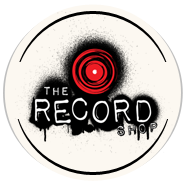 Sean Giovanni, owner and chief producer/engineer at The Record Shop in Nashville, has accumulated an impressive and diverse client list over the years, with names that include Tim McGraw, Brett Michaels, John Legend, Randy Houser, Big & Rich and DJ Sinister, to name a few. Sean also happens to be one of the Recording Connection’s finest mentors, and during a recent conversation with us, he drew from his own experiences to offer some crucial advice for students looking tor break into the recording industry.
Sean Giovanni, owner and chief producer/engineer at The Record Shop in Nashville, has accumulated an impressive and diverse client list over the years, with names that include Tim McGraw, Brett Michaels, John Legend, Randy Houser, Big & Rich and DJ Sinister, to name a few. Sean also happens to be one of the Recording Connection’s finest mentors, and during a recent conversation with us, he drew from his own experiences to offer some crucial advice for students looking tor break into the recording industry.
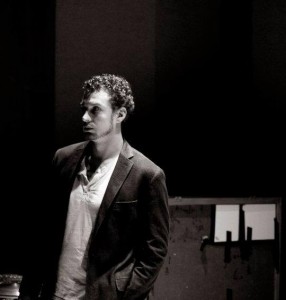 Sean started learning and making music at an early age, but soon figured out he wanted more. “When I was a kid, I took guitar lessons and piano lessons,” says Sean, “but I got frustrated because I wasn’t really excelling…and in my mind I had this grand vision for the way that songs were arranged. So later on in life, I realized that at my core, I was really meant to be a producer and engineer, to direct and create all the sounds as opposed to just focusing on just one of them like a musician does.”
Like many producers and engineers, Sean’s entry into the music industry came from forging his own path. He urges up-and-coming producers to do the same. “Once you have the education, rather than trying to start out right away by getting a job in the studio, if you can’t find a job in the studio, find a band you can record, and bring them into the studio,” he says. “When I moved to Nashville, I couldn’t get a job anywhere, and I got a job DJing in a club downtown, and that’s how I made a living. Then I would find artists and bands, and I ended up connecting with a small studio who let me use their facility after hours, and gave me free reign over the place. So I made work for myself, and I found artists that I could work with and I brought them in. Then [the studio owner] saw all the business I could bring in, and he started bringing me in on projects…it just kind of grew from there…I found that getting started out, if I could add value to the organization, they’re much more interested in sending me work or giving me opportunity. If I can make them money, they’re going to want to hire me to do things.”
Sean started learning and making music at an early age, but soon figured out he wanted more. “When I was a kid, I took guitar lessons and piano lessons,” says Sean, “but I got frustrated because I wasn’t really excelling…and in my mind I had this grand vision for the way that songs were arranged. So later on in life, I realized that at my core, I was really meant to be a producer and engineer, to direct and create all the sounds as opposed to just focusing on just one of them like a musician does.”
Like many producers and engineers, Sean’s entry into the music industry came from forging his own path. He urges up-and-coming producers to do the same. “Once you have the education, rather than trying to start out right away by getting a job in the studio, if you can’t find a job in the studio, find a band you can record, and bring them into the studio,” he says. “When I moved to Nashville, I couldn’t get a job anywhere, and I got a job DJing in a club downtown, and that’s how I made a living. Then I would find artists and bands, and I ended up connecting with a small studio who let me use their facility after hours, and gave me free reign over the place. So I made work for myself, and I found artists that I could work with and I brought them in. Then [the studio owner] saw all the business I could bring in, and he started bringing me in on projects…it just kind of grew from there…I found that getting started out, if I could add value to the organization, they’re much more interested in sending me work or giving me opportunity. If I can make them money, they’re going to want to hire me to do things.”
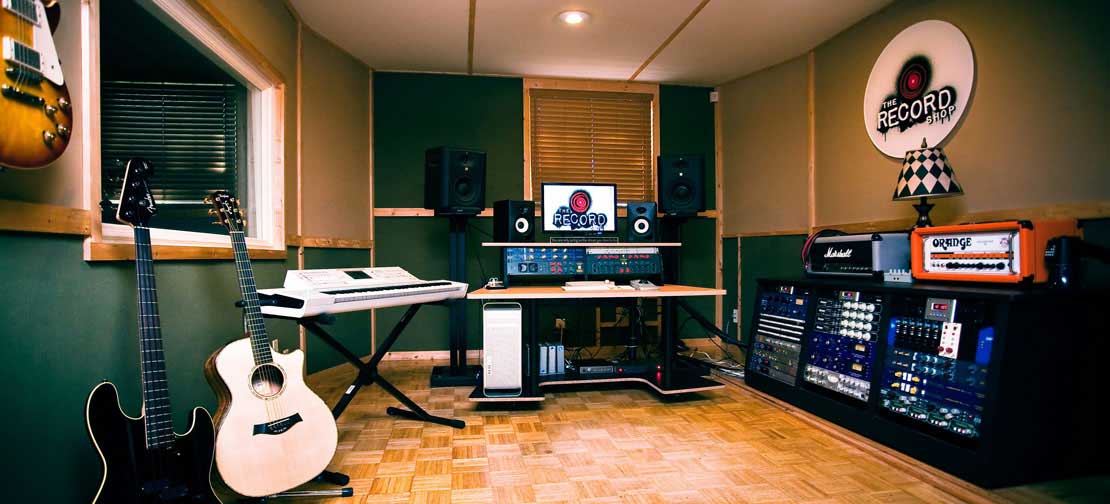 Sean also encourages new producers and engineers to be as diverse as possible in the kind of music they work with, again referring to his own experience in the industry. “It’s good to have a basic knowledge of every style of music,” he says. “It’s helped me in the evolution of country music, for example. My background in programming and pop tracks and hip-hop has been so valuable for me to be able to jump on this new wave of country music that’s coming out that’s very heavily programmed and has a lot of pop influences. And there’s not a lot of the country guys that could jump in and do that, so I find myself getting a lot of work on that side of things because I can do both of them. I can do a straight-up country record, and I can do the pop thing and combine them together. And it’s helped in other genres as well.”
Making connections has played a huge role in Sean’s current successes as a producer/engineer, with new projects coming his way after doing good work on previous ones. He shares that his opportunity to work for major labels in Nashville essentially came as a result of helping out a friend. He encourages up-and-coming artists to keep an open mind when considering projects, even if the pay is low.
“Be open to helping people out,” he says, “recognizing the value of doing something. Even if you’re getting paid less than you think you’re worth, the value that can come from that later on is going to be exponentially more than the little bit of money that you make at first. That was my thought process starting out, and now I don’t have to worry about that at all, which is an awesome thing.”
Sean also encourages new producers and engineers to be as diverse as possible in the kind of music they work with, again referring to his own experience in the industry. “It’s good to have a basic knowledge of every style of music,” he says. “It’s helped me in the evolution of country music, for example. My background in programming and pop tracks and hip-hop has been so valuable for me to be able to jump on this new wave of country music that’s coming out that’s very heavily programmed and has a lot of pop influences. And there’s not a lot of the country guys that could jump in and do that, so I find myself getting a lot of work on that side of things because I can do both of them. I can do a straight-up country record, and I can do the pop thing and combine them together. And it’s helped in other genres as well.”
Making connections has played a huge role in Sean’s current successes as a producer/engineer, with new projects coming his way after doing good work on previous ones. He shares that his opportunity to work for major labels in Nashville essentially came as a result of helping out a friend. He encourages up-and-coming artists to keep an open mind when considering projects, even if the pay is low.
“Be open to helping people out,” he says, “recognizing the value of doing something. Even if you’re getting paid less than you think you’re worth, the value that can come from that later on is going to be exponentially more than the little bit of money that you make at first. That was my thought process starting out, and now I don’t have to worry about that at all, which is an awesome thing.”
 The Recording Connection is pleased to welcome the latest top-shelf industry pro to help us teach our students: Jeremiah Slovarp, producer/engineer and owner of Peach Street Studios in Bozeman, Montana!
The Recording Connection is pleased to welcome the latest top-shelf industry pro to help us teach our students: Jeremiah Slovarp, producer/engineer and owner of Peach Street Studios in Bozeman, Montana!
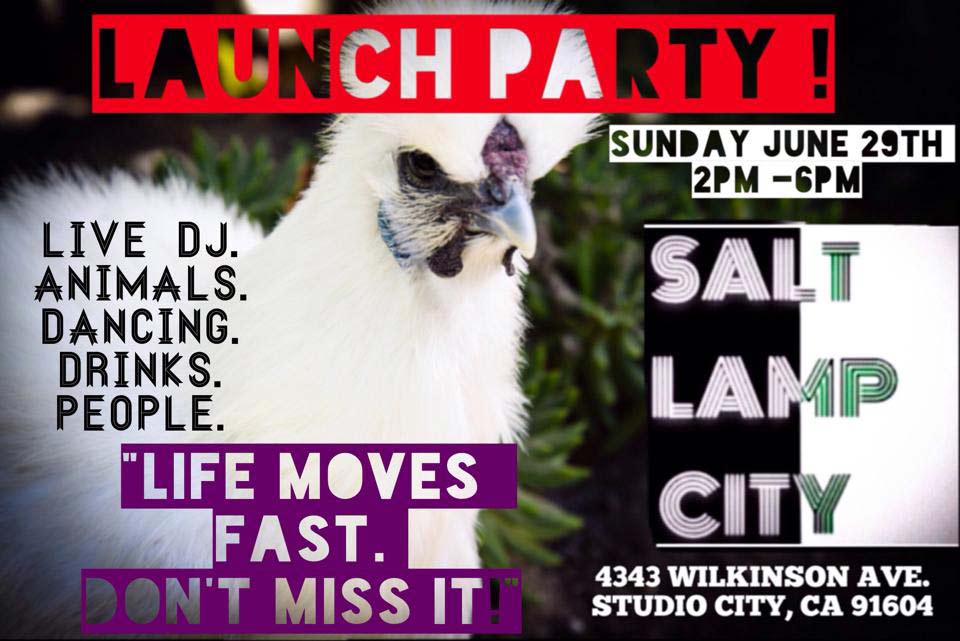 Join us this Sunday for the LAUNCH PARTY of Peter DeWitt’s production group Salt Lamp City Collective in Studio City.
DJ, Animals, Dancing, and Good times! Get out there and network with fellow Audio Engineers, musicians, and producers!
Free admission: mention that you were referred by THE RECORDING CONNECTION!
From their facebook page:
“Danny Shyman, Peter DeWitt and a group of fresh artists promote their new collective, “Salt Lamp City”. Come meet the artists, have a drink, network and dance to a live DJ set by DJ EL RAY (of the production duo Blue Moss)!!”
Join the event on facebook and invite your friends!
SoundCloud | Facebook | www.saltlampcitycollective.com | Tumblr
Instagram: saltlampcity | Twitter: @SaltLampCity
Join us this Sunday for the LAUNCH PARTY of Peter DeWitt’s production group Salt Lamp City Collective in Studio City.
DJ, Animals, Dancing, and Good times! Get out there and network with fellow Audio Engineers, musicians, and producers!
Free admission: mention that you were referred by THE RECORDING CONNECTION!
From their facebook page:
“Danny Shyman, Peter DeWitt and a group of fresh artists promote their new collective, “Salt Lamp City”. Come meet the artists, have a drink, network and dance to a live DJ set by DJ EL RAY (of the production duo Blue Moss)!!”
Join the event on facebook and invite your friends!
SoundCloud | Facebook | www.saltlampcitycollective.com | Tumblr
Instagram: saltlampcity | Twitter: @SaltLampCity

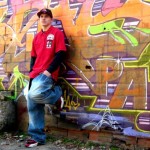 Recording Connection graduate Chase Ritter is currently starting up his very own record label to help out some up-and-coming artists in the Howard Country, Maryland area! Congratulations, Chase!
Recording Connection graduate Chase Ritter is currently starting up his very own record label to help out some up-and-coming artists in the Howard Country, Maryland area! Congratulations, Chase!
 Through the many connections she’s made as a student, Film Connection apprentice Parushka Moodley recently landed an internship at CBS in Los Angeles! Congrats!
Recording Connection graduate Eugene Kim recently checked in with us. “I’m a Recording Connection alum from 2011 and am with the same studio I started the program with,” he says. “It’s been a great experience and find myself the lead audio post engineer here, which I love. I’ve built what I think is a very decent reel with good clients and have worked on everything from features, to broadcast and web based projects. I’ve even branched out to production sound (booming and mixing) which I find fascinating and very rewarding.”
Through the many connections she’s made as a student, Film Connection apprentice Parushka Moodley recently landed an internship at CBS in Los Angeles! Congrats!
Recording Connection graduate Eugene Kim recently checked in with us. “I’m a Recording Connection alum from 2011 and am with the same studio I started the program with,” he says. “It’s been a great experience and find myself the lead audio post engineer here, which I love. I’ve built what I think is a very decent reel with good clients and have worked on everything from features, to broadcast and web based projects. I’ve even branched out to production sound (booming and mixing) which I find fascinating and very rewarding.”
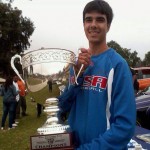 Radio Connection apprentice Callan McClurg recently hosted the play by play of a LIVE game on June 13th for the San Diego Force! “Everything is fantastic!” he says. “We’re chugging into the Sports Broadcasting unit of the course, and through the station, I am now doing actual sports play-by-play broadcasting!” Congratulations, Callan! (Follow Callan’s updates on Twitter @Callanmac3)
Radio Connection apprentice Callan McClurg recently hosted the play by play of a LIVE game on June 13th for the San Diego Force! “Everything is fantastic!” he says. “We’re chugging into the Sports Broadcasting unit of the course, and through the station, I am now doing actual sports play-by-play broadcasting!” Congratulations, Callan! (Follow Callan’s updates on Twitter @Callanmac3)
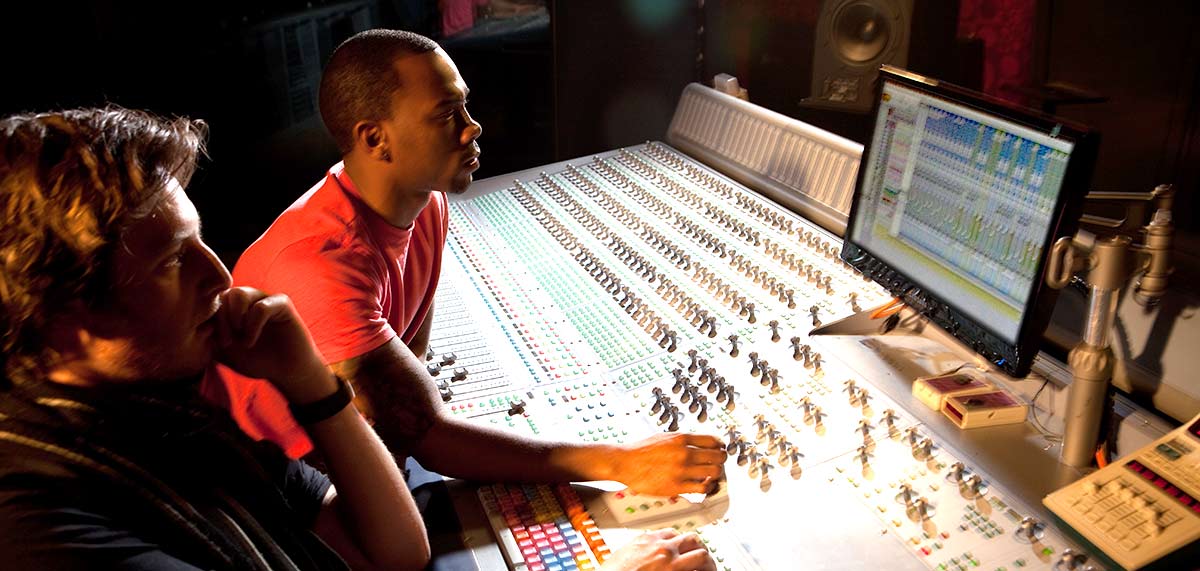

RRFC is education upgraded for the 21st century.
Get the latest career advice, insider production tips, and more!
Please fill out the following information, and RRFC Admissions will contact you to discuss our program offerings:
Stay in the Loop: Subscribe for RRFC news & updates!
© 2025 Recording Radio Film Connection & CASA Schools. All Rights Reserved.


